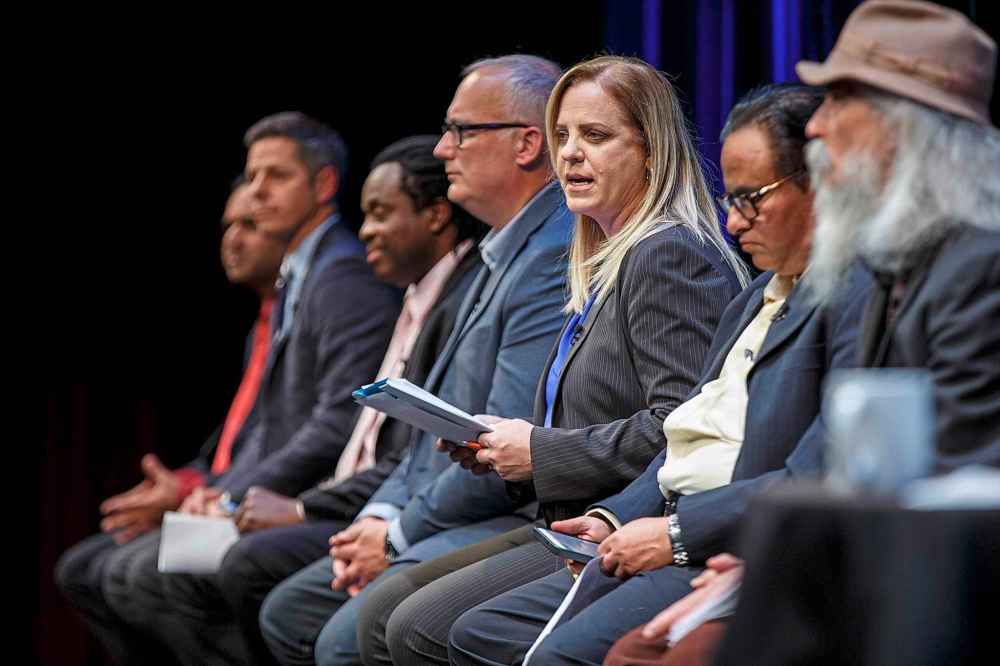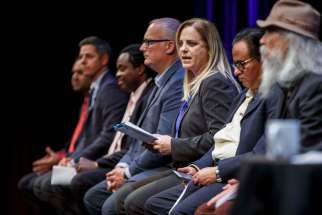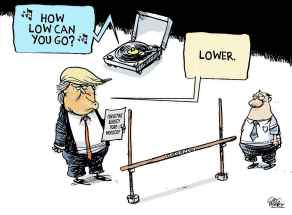Whither the left? For the first time in years, there is no mayoral candidate endorsed by the Winnipeg Labour Council
Read this article for free:
or
Already have an account? Log in here »
To continue reading, please subscribe:
Monthly Digital Subscription
$0 for the first 4 weeks*
- Enjoy unlimited reading on winnipegfreepress.com
- Read the E-Edition, our digital replica newspaper
- Access News Break, our award-winning app
- Play interactive puzzles
*No charge for 4 weeks then price increases to the regular rate of $19.00 plus GST every four weeks. Offer available to new and qualified returning subscribers only. Cancel any time.
Monthly Digital Subscription
$4.75/week*
- Enjoy unlimited reading on winnipegfreepress.com
- Read the E-Edition, our digital replica newspaper
- Access News Break, our award-winning app
- Play interactive puzzles
*Billed as $19 plus GST every four weeks. Cancel any time.
To continue reading, please subscribe:
Add Free Press access to your Brandon Sun subscription for only an additional
$1 for the first 4 weeks*
*Your next subscription payment will increase by $1.00 and you will be charged $16.99 plus GST for four weeks. After four weeks, your payment will increase to $23.99 plus GST every four weeks.
Read unlimited articles for free today:
or
Already have an account? Log in here »
Hey there, time traveller!
This article was published 05/10/2018 (2624 days ago), so information in it may no longer be current.
When the dust settles on the 2018 civic election campaign, some observers will ask: what happened to the left?
While the Winnipeg Labour Council endorsed eight candidates in ward races, there was no champion from the city’s progressive camp to carry the mayoral flag.
Winnipeg voters are used to seeing a labour-endorsed mayoral candidate. Before this year, the labour council backed a candidate in six consecutive civic elections, dating back to Glen Murray’s first successful campaign in 1998.
“At the time when we were doing endorsements, there was nobody really (on the left) that we had considered, that was why we hadn’t endorsed anyone for mayor,” said council president Basia Sokal.
Veteran New Democrat Judy Wasylycia-Leis carried the flag for the left in two back-to-back campaigns. She lost to incumbent Sam Katz in 2010 and despite being the front-runner in 2014 until the last days of that tumultuous campaign, her support disappeared and she finished a distant second to Brian Bowman.
Endorsements, past and present
Winnipeg Labour Council endorsed ward candidates for 2018 Winnipeg municipal election
- Sherri Rollins – Fort Rouge-East Fort Garry
- Matt Allard – St. Boniface
- Ross Eadie – Mynarski
- Jason Schreyer – Elmwood-East Kildonan
- Kurt Morton – St. James
- Brian Mayes – St. Vital
- Kate Sjoberg – Point Douglas
- Josh Brandon – Daniel McIntyre
Winnipeg Labour Council endorsed mayoral candidates
- 2014: Judy Wasylycia-Leis, finished second to Brian Bowman
- 2010: Judy Wasylycia-Leis, finished second to Sam Katz
- 2006: Marianne Cerilli, finished second to Sam Katz
- 2004: Dan Vandal, finished second to Sam Katz
- 2002: Glen Murray
- 1998: Glen Murray
- 1995: Terry Duguid
Did Wasylycia-Leis’ double defeat scare off any likely individuals? Was Winnipeg’s power of incumbency considered too strong to mount a challenge against Bowman? Had Bowman managed over the past four years to clamp a hold on the so-called ‘middle ground’ that any successful progressive candidate would need? Yes, to all of that, said those who watch the local political scene.
“I think there is a lack of leadership at the moment,” among labour and the left, said veteran political scientist Raymond Hebert. “I think the troops are in disarray.”
Hebert said the infighting among the provincial NDP and the party’s trouncing by the Pallister Tories in the 2016 provincial election disheartened activists and robbed that end of the political spectrum of leaders.
Hebert and fellow political scientist Aaron Moore agree that Bowman’s success in the past four years has made it difficult for anyone from the left to mount a successful challenge, which resulted in no one stepping forward this time out.
“I don’t think (Bowman) is like (Calgary mayor Naheed) Nenshi, where there is a huge chunk of the population that just adores him and there’s a chunk that just hates him,” said Moore, an associate professor at the University of Winnipeg. “I think there are small parts of the population that love or hate (Bowman) but the majority are probably lukewarm to him — but that’s enough.

“He’s paving the roads, we’re getting our garbage service and I don’t think he’s done anything in the last four years to really upset the majority of the population. Because of that, (the left) would have to get another really big name, like Judy Wasylycia-Leis, somebody that the public really recognizes and have them run against him because otherwise (a challenger) would be in the same position as Jenny Motkaluk, where you start off having people getting to know your name.
“Those people, the ones with the big names, they are going to wait until there is a better opportunity to run, like when there is no incumbent.”
Bowman proved in the 2014 race to be that odd combination of a truly, progressive conservative – a private practice lawyer, the former chairman of the Chamber of Commerce who loves transit and the downtown, wants to open Portage and Main to pedestrians, and promises little property tax increases every year to fix the roads.
During the past four years Bowman certainly alienated the power blocs that traditionally support the right-wing candidate – developers, home builders, the construction industry – but he maintained that progressive-conservative image, making it difficult for a truly progressive individual to find support among voters.
Even the largest union at city hall, CUPE 500, came out recently and unofficially endorsed Bowman, finding him the best of the lot this time out.
“I don’t think running from the right is the way to win. I think Bowman has a better strategy to appeal to a broad swath of the population on both sides of the spectrum,” Hebert said. “That disarms the left. Combined with the other factors (disarray and fatigue among the Left/NDP), it seems to be a winning formula for Brian Bowman and it seems to have disarmed any possible challenge from the left.”
Hebert and Moore’s analysis seems to be supported by the Labour Council’s inability to find a name candidate. Sokal said the labour council couldn’t find anyone from the Left who wanted to carry the banner this time out..

“We talked with a lot of folks who just felt, there were a myriad of reasons, but a lot of the reasons was this was just not good timing… from their personal lives, it wasn’t a good point in their time to take it on,” Sokal said. “A lot of people that were considering it, it just wasn’t the right fit for them at this time.”
Moore said another factor against a candidate from the Left is the power of incumbency. It’s been more than 60 years since a sitting Winnipeg mayor was defeated by challenger. The last one to do that was the flamboyant Stephen Juba in 1956 and he then held onto the job for 20 years.
“When you have an incumbent straddling that centre area and people are generally okay with him, it becomes very difficult to actually break in and get enough votes to actually challenge him,” Moore said.
The most recent election poll, released Thursday, shows that Bowman – who was once considered a possible PC leadership candidate – enjoys a strong level of support among those who identify themselves as members of the three traditional political parties but surprisingly, his level of support his stronger among Liberals (72%) and New Democrats (69%) than that among Tories (52%).
Some might argue that Bowman got those Left votes by default, because no one from the Left stepped forward to challenge him. The other argument is that no one from the Left stepped forward because it would be too difficult to take those votes away from Bowman.
“To defeat an incumbent, you need someone who is a big name but outside of attracting a senior level of politician with their own package, in general it’s increasingly hard to attract good candidates, who the public will recognize and their intentions are in the right place,” Moore said. “A lot of those people won’t enter now.
“The only way a left-wing candidate would really have any chance is if there was a much stronger candidate to the right of Bowman to take a lot of those votes away from him but Jenny Motkaluk is not the type of challenger to split enough of the right vote to allow a left wing candidate to really make an inroad.”
aldo.santin@freepress.mb.ca









